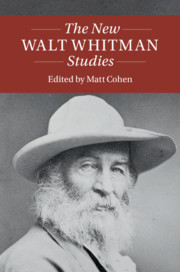Book contents
- The New Walt Whitman Studies
- Twenty-First-Century Critical Revisions
- The New Walt Whitman Studies
- Copyright page
- Contents
- Figures
- Contributors
- Acknowledgments
- Introduction
- Part I The New Life of the New Forms: Aesthetics, Disciplines, Politics
- Chapter 1 Whitman’s “Deathbed” Radicalism and Its Modernist Effects
- Chapter 2 Whitman, Women, and Privacy
- Chapter 3 The Poetics of a New Science: “Song of Myself” as Sociology
- Chapter 4 World Wide Walt: Making and Marketing Whitman’s Global Persona
- Chapter 5 Intimacies of Place: Walt Whitman and the Politics of Settler Sensation
- Part II Wet Paper Between Us: New Reading Methods
- Part III A Kosmos: The Critical Imagination
- Index
Chapter 4 - World Wide Walt: Making and Marketing Whitman’s Global Persona
from Part I - The New Life of the New Forms: Aesthetics, Disciplines, Politics
Published online by Cambridge University Press: 03 November 2019
- The New Walt Whitman Studies
- Twenty-First-Century Critical Revisions
- The New Walt Whitman Studies
- Copyright page
- Contents
- Figures
- Contributors
- Acknowledgments
- Introduction
- Part I The New Life of the New Forms: Aesthetics, Disciplines, Politics
- Chapter 1 Whitman’s “Deathbed” Radicalism and Its Modernist Effects
- Chapter 2 Whitman, Women, and Privacy
- Chapter 3 The Poetics of a New Science: “Song of Myself” as Sociology
- Chapter 4 World Wide Walt: Making and Marketing Whitman’s Global Persona
- Chapter 5 Intimacies of Place: Walt Whitman and the Politics of Settler Sensation
- Part II Wet Paper Between Us: New Reading Methods
- Part III A Kosmos: The Critical Imagination
- Index
Summary
This chapter discusses the accretion of an extraordinary amount of criticism and commentary on Whitman over the past 150 years. It studies one as-yet underexplored area of his writing: his old-age poetry. This poetry was added to Leaves of Grass in Whitman’s last years in what he called “annexes.” Whitman’s experimental inclinations remained intense in these often-overlooked poems, as he invented new techniques involving open enjambment, transegmental drift, and pronoun disappearance, creating a poetry unlike most of his earlier work: shorter, less accepting of death, and yet still affirmative of many of the basic ideas he had developed from the 1855 Leaves on. These late poems introduced some formal qualities that we now associate much more with modernist and postmodern poets, and they also can be read as some of the most honest and powerful confrontations with old age and a decaying body that any poet has produced.
- Type
- Chapter
- Information
- The New Walt Whitman Studies , pp. 68 - 82Publisher: Cambridge University PressPrint publication year: 2019

